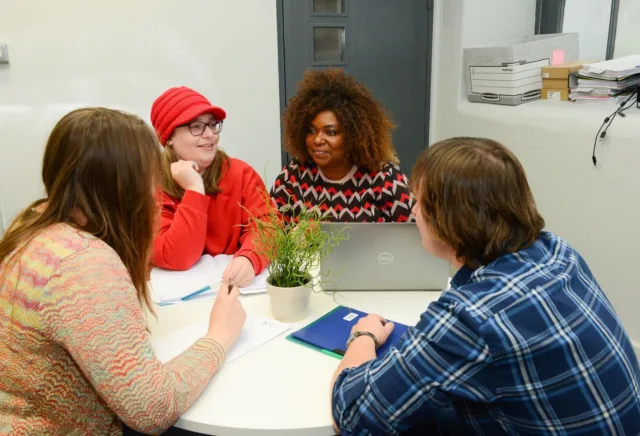View all Courses
Applied Approaches to Childhood Autism
Bachelor of Science
Course Details
| Course Code | LY_VAACA_D |
|---|---|
| Level | 7 |
| Duration | 2 years |
| Credits | 60 |
| Method of Delivery | Blended |
| Campus Locations | Donegal – Letterkenny |
| Mode of Delivery | Part Time |

Course Overview
Course Details
Year 1
| Semester | Module Details | Credits | Mandatory / Elective |
|---|---|---|---|
| 1 |
Understanding AutismThis module will delve into the historical context of autism. Students will be able to identify the characteristics of autism in childhood. The influence of mass media on social consciousness regarding autism is explored. National policy and legislation regarding access and full participation will be identified and the impact of these on service provision in Ireland will be analysed. Learning Outcomes 1. Describe the characteristics of autism while attaining knowledge and understanding. |
05 | Mandatory |
| 1 |
Diagnosis, Assessment & Early InterventionThis module introduces the student to the developments in diagnostic tools and assessment procedures in Ireland. Early intervention therapies are considered along with the role of multidisciplinary work in supporting the child and family. Influences on provision of person-centred services will be analysed. Students will also explore the lived experiences of individuals on the autism spectrum. Learning Outcomes 1. Explain the development of assessment tools and criteria in Ireland. |
05 | Mandatory |
| 1 |
Language and Social CommunicationThis module will enable the student to understand, foster and promote Language and Social Communication in children with a diagnosis of Autism Spectrum Disorder. Learning Outcomes 1. Appraise the methodologies used to support language development in children with autism. |
10 | Mandatory |
| 2 |
Functional Behaviour & Positive SupportsThis module will enable the student to develop an understanding of human behaviour and why all behaviour is functional for a child on the autism spectrum. The possible causes of behaviour will be examined, considering the possible contributing factor of adverse Childhood Experiences (ACEs). Students will gain an insight into the various proactive strategies and evidence -based interventions that can be used to lessen the impact of learned and reinforced behaviours. The student will explore ways of collecting data to help inform their choice of intervention, while debating the legal and ethical considerations around managing and or changing functional behaviour. Learning Outcomes 1. Appraise the behavioural theories which underpin human behaviour |
10 | Mandatory |
| 2 |
Technology to Foster EngagementThis module will enable the student to gain insight into how technology can be used to support and engage students with a diagnosis of Autism Spectrum Disorder. Learning Outcomes 1. Analyse how technology can best support children on the autism spectrum in terms of communication, social skills development, peer relationships and confidence. |
10 | Mandatory |
| 2 |
Sensory Processing & Sensory DietsThis module will develop student's knowledge and understanding of sensory processing and the regulating function of the nervous system. Students will be able to define and understand the value of a sensory diet for hypo / hyper sensory seeking in children with autism. Students will be able to appraise the sensory needs of the child, consider the factors that can affect/enhance relationships/learning. They will be able to design and implement activities and strategies to support the specific sensory needs of the child. Students will gain a clear understanding of collaborative support. Learning Outcomes 1. Identify and appraise sensory processing differences and the function of the nervous system |
10 | Mandatory |
| 2 |
Independence and Life SkillsThis module identifies the role of the adult in supporting independence and life skills for children with autism. Strategies will be explored to assist the student in developing techniques to help master skills that can foster independence. An audit of methods employed in current practice will assist the student to critique the outcomes for the child and potential towards their future life independence and satisfaction. Learning Outcomes 1. Explore the challenges in daily living skills within a range of different environments. |
10 | Mandatory |
Recommended Study Hours per week
Examination and Assessment
On-Campus Attendance Requirement
Note: Check programme Examination and Assessment requirements, as they may involve examinations to be taken on campus.
Download a prospectus
Entry Requirements
Fees
Total Fees EU: €5400
Fees for this part-time programme may be covered under the SUSI fee scheme for eligible candidates.
Further information on feesFor information on ATU’s SUSI approved courses, visit atu.ie/susi-part-time.
For information on how to apply for SUSI funding, visit https://www.susi.ie/funding-for-part-time-undergraduate-courses/
Careers
Further Information
Application Closing Date
Start Date
Who Should Apply?
Contact Information
Faculty of Science & Health
Department of Early Education & Social Studies
Early Education & Social Studies


